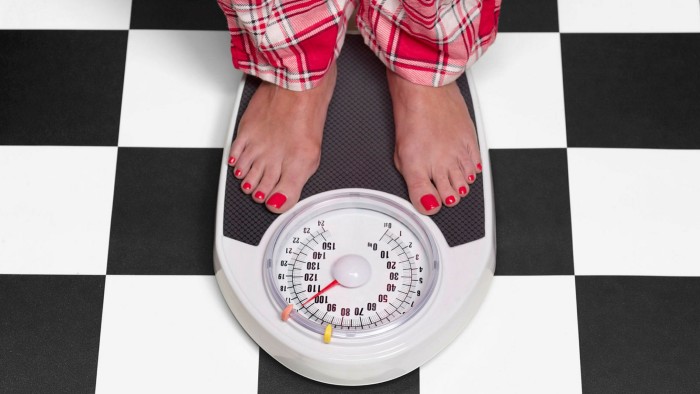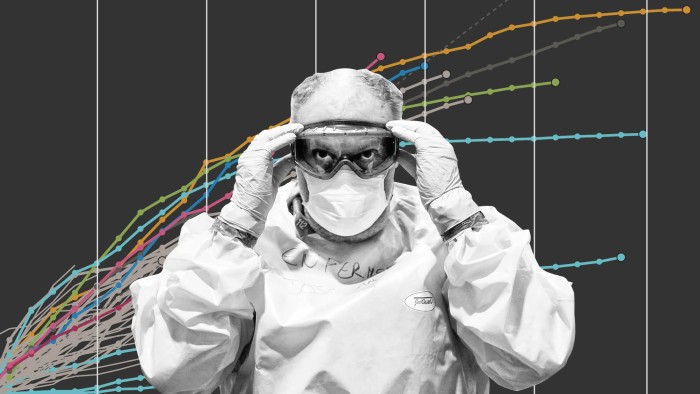Wealth is nothing without health


Roula Khalaf, Editor of the FT, selects her favourite stories in this weekly newsletter.
Have you gained weight under lockdown? I am aware this is a highly personal question — but it’s one I am willing to answer.
I also think it’s a conversation that more of us need to be prepared to have. Just like discussing money, talking about weight is still very much a taboo. Yet our physical health will have a much bigger impact on our future wealth than we perhaps realise. The sudden arrival of Covid-19 might have moved this further to the front of your mind, but my own wake-up call came just before Christmas.
I had been meaning to sort out critical illness cover for some time. My financial adviser found a competitive quote by aligning my cover with the sick pay and income protection I already had under my existing workplace plan.
However, when I went through the nitty gritty on the phone, the cost of the policy had shot up by £20 a month (so nearly an extra £250 a year). How had this happened?
The answer was my weight.
With a body mass index (BMI) just north of 30, I was classified as obese (there was a bit of an awkward silence on the line after that!). It’s not that I’d been in denial about my weight, but like all diet and fitness regimes, it was always something I thought I could start tomorrow.
Somehow, knowing that an insurance company was charging me more because I was at far greater risk of having a stroke, heart disease or many forms of cancer in future years was the jolt I needed.
Nobody has yet written a diet book called “How being fat could eff-up your finances”, but I am very tempted to do so.
To wit, if a pandemic-spawned depression totals my pension and economic growth goes mostly backwards for the next 20 years, being fit and healthy is going to be one of my biggest assets. I will hopefully be able to work for longer, save more of what I’m earning and spend less of it on medical treatment.
Even if this doomsday scenario fails to materialise, good health is still worth investing in. Ironically, working long hours to earn as much money as you can is not going to earn you a better quality of retirement if you end up contracting type-2 diabetes in your forties or fifties. Obesity also increases your chances of complications with Covid-19. Even so, it is very difficult to change the habits of a lifetime.
Long before lockdown started, I spent some time working out what needed to change. I went to see my GP (who was great), read all manner of books and downloaded an app to log everything I ate, which was the real eye-opener. So much food either eaten at my desk, or purchased on the way to and from it in a hurry. And much of it falling into the carb-o-rama category.
I also had long and frank conversations with friends who had successfully lost weight — top tip, buy a smaller dinner plate and do not allow yourself to have second helpings, ever — and told my family I needed their help to turn things around.
Editor’s note

The Financial Times is making key coronavirus coverage free to read to help everyone stay informed. Find the latest here.
Sorting out the food side of things is 80 per cent of the battle, but at my regular “weigh in” and chat with the practice nurse, he suggested I tried the free Couch to 5k app.
It is a brilliant concept. First, make your own playlist of songs to run to. Mine consists of anything that would get me on a dance floor, so there’s a lot of Duran, Spandau, Tears for Fears and (ahem) Level 42.
When you launch the app, a voice floats over the top of the music telling you to walk, then run, then walk, then run again for fixed intervals. You do this for three times a week. At first, the running parts only last for one minute. Over a nine week period, this is gradually extended to the point where you can run for 30 minutes without stopping.
At the halfway point, a bell rings (I cannot tell you what a joyous sound this is when you’re sweating your way around a park full of thinner, faster people than you). The friendly voice floats back every so often to say “keep a steady pace” or “there’s only 60 seconds left, so push on through the pain”.
All that stuff they say about a “runner’s high”? It’s true. I was amazed at how rapidly my fitness improved and, psychologically, this helped me stick to better eating habits.
Even so, it was not until the lockdown started that I was able to finish the programme and consistently change my diet. The good news is, since the middle of March, I’ve lost nearly a stone in weight.
Plenty of others have put on weight under lockdown and are now trying to burn it off — including Gyles Brandreth, who published this poem in his column in The Oldie magazine this month:
To lose two pounds a week, to regain a figure slim and sleek,
The rules are simple, if not nice: No bread, potato and no rice,
And when it comes to pasta, basta!
It has been easy to avoid eating convenience foods — smugly, we have only had two takeaways since lockdown started, and I’ve stopped adding dangerous items like crisps or chocolate to our internet shopping order — but I confess that I find it much harder to avoid a glass of wine.
The biggest asset I’ve had to learn to manage is my time. Finding the time to exercise, plus plan (and cook) healthy meals has been so much easier to do without having to travel to the office and back every day. When we do return to normal working life, I am hoping these habits will be ingrained deeply enough to last. In any case, I am now fit enough to eschew the Tube and run to the office.
I am currently able to run nonstop for one hour, which I never thought was possible. Each week, I push myself to increase my speed. For now, I am running the Couch to 5k 30-minute programme twice over, as I have yet to find a better app — although I would love to hear readers’ suggestions.
My stepchildren are also encouraging me to expand my running playlist in new directions. My current favourite is Tame Impala — though even my stepson admits that the falsetto vocals have an echo of Level 42 about them.
Claer Barrett is the editor of FT Money and a financial commentator on Eddie Mair’s LBC drive-time show on weekdays between 4-6pm: claer.barrett@ft.com; Twitter @Claerb; Instagram @Claerb
Comments